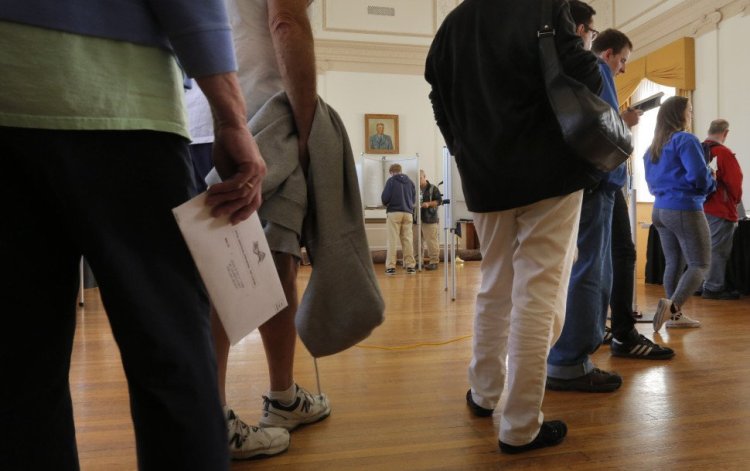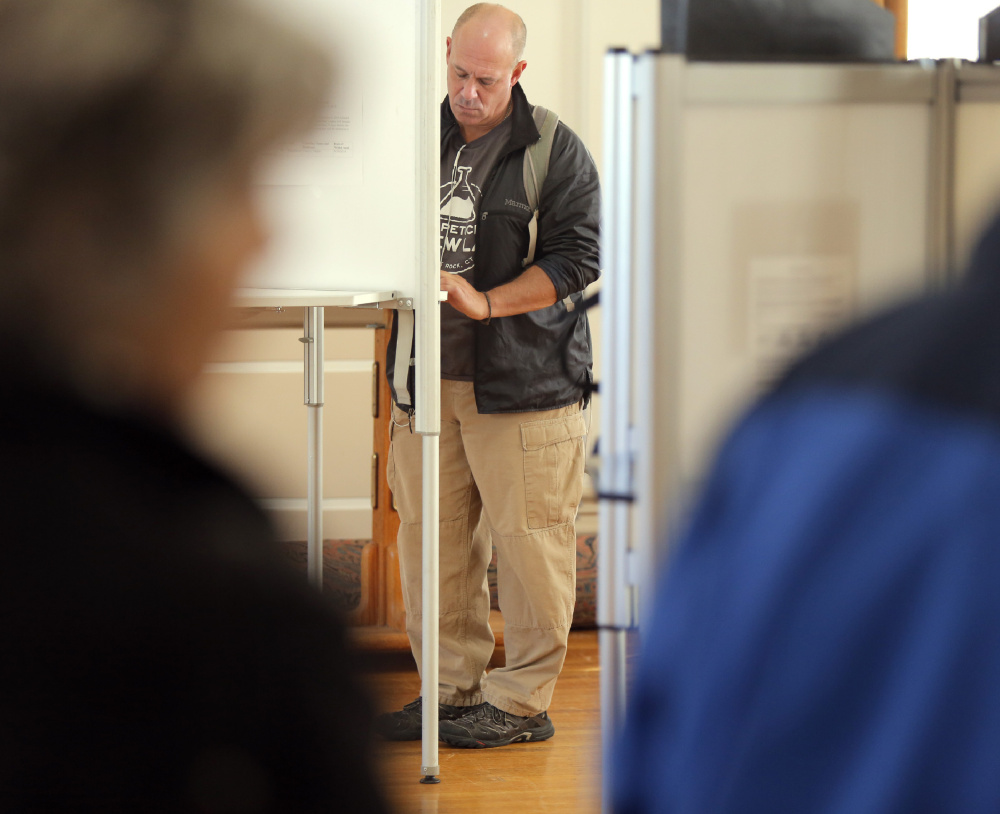A line stretched out the door Tuesday at the State of Maine Room at Portland City Hall, with about 15 people waiting to vote in the November presidential election pitting Democrat Hillary Clinton against Republican Donald Trump.
Tuesday was the first day of early voting – known officially in Maine as in-person absentee voting – and clerks from across the state were reporting brisk turnouts. Election Day is Nov. 8.
A harried Kathy Jones, Portland’s clerk, said the turnout was strong and heavier than the early balloting in the 2012 presidential election, when President Obama won re-election over Republican challenger Mitt Romney.
Lisa Goodwin, Bangor’s city clerk, said “absentee voting is brisk, both in person and those requesting a ballot to be mailed to them.”
Clerks in Old Town and Lisbon also reported heavy absentee voting.
“Yes, we have been bombed today (Tuesday),” said Patricia Brochu, Old Town city clerk, referring to voting activity.
While Maine has had in-person absentee voting for a long time – the League of Women Voters of Maine said it’s been so many years that they couldn’t immediately pinpoint when it started – awareness of early voting has increased in recent years, as more states adopt the practice and more people vote early.
“The opportunity to vote absentee is a building trend,” said Ann Luther, advocacy chair for the League of Women Voters of Maine. “In some municipalities, it’s upwards of 50 to 60 percent of all votes cast.”
Luther said when Maine adopted “no excuses” absentee voting in 1999, it removed a barrier to voters and absentee voting increased. Previously, voters had to come up with a valid excuse to vote absentee, such as a planned trip out of state.
Of nearly 725,000 votes cast in the 2012 presidential election, 190,216 were cast as absentee, either in-person or mailed in, according to the Maine Secretary of State’s Office. In 2008, of 744,000 votes cast, 238,940 were cast as absentee.
While Tuesday was the first day of in-person early voting, voters in Maine have so far requested 40,193 mail-in absentee ballots, the Secretary of State’s Office reported.
In Portland, a Democratic stronghold, most voters interviewed at City Hall after they had voted said they preferred Clinton over Trump.
Carolyn Wronker, 71, said she was motivated to vote early for convenience and she can more easily tune out the campaigning after she votes.
“It just gets exhausting and disappointing,” Wronker said. “It seems like the longer the candidates have to go at each other, and the closer it gets to the election, the uglier it gets.”
Gregory Seligman, 51, said he felt so strongly about the election, that he wanted to vote early to make sure his vote was lodged for Clinton.
“What if, God forbid, I came down with the flu or some other illness on Election Day?” Seligman said. “I got it over with.”
James Jennison, 61, said he wasn’t planning on voting on Tuesday, but when he was reminded about it by someone advocating for the referendum to legalize marijuana, he stopped at City Hall to vote.
“I thought, it’s a great day, and it was a great idea to vote. It’s very convenient,” said Jennison, who strongly supports marijuana legalization because he believes in “personal freedom.” Jennison said he voted for Green Party candidate Jill Stein for president.
Maine does not technically have early voting, said Kristen Muszynski, spokeswoman for the Maine Secretary of State. In early voting, the clerk’s offices can tabulate the votes as they come in, but absentee ballots are counted on Election Day.
“It’s not really any different for voters,” Muszynski said.
Across the nation, early voting has become popular and critical to get-out-the-vote efforts, especially in battleground states like Ohio and North Carolina. Nationally, about 30 percent of all votes cast in the presidential elections of 2012 and 2008 were cast early, a sharp increase from 22 percent in 2004.
Both parties put considerable effort into turning out absentee voters in order to get loyalists to the polls.
Thirty-four states and the District of Columbia now have some form of early voting.
Send questions/comments to the editors.




